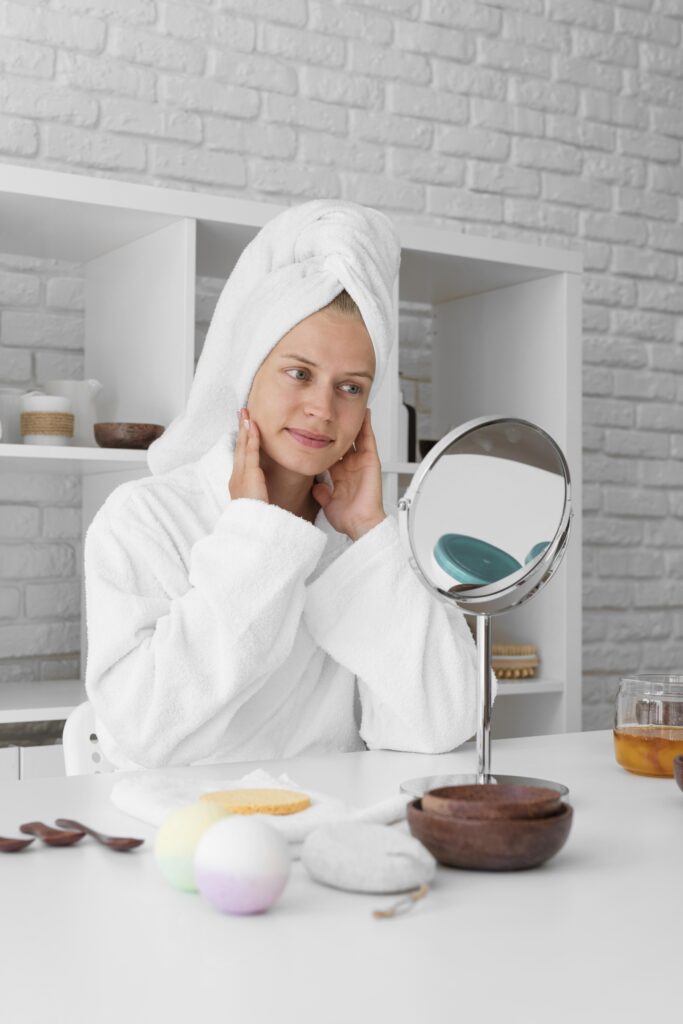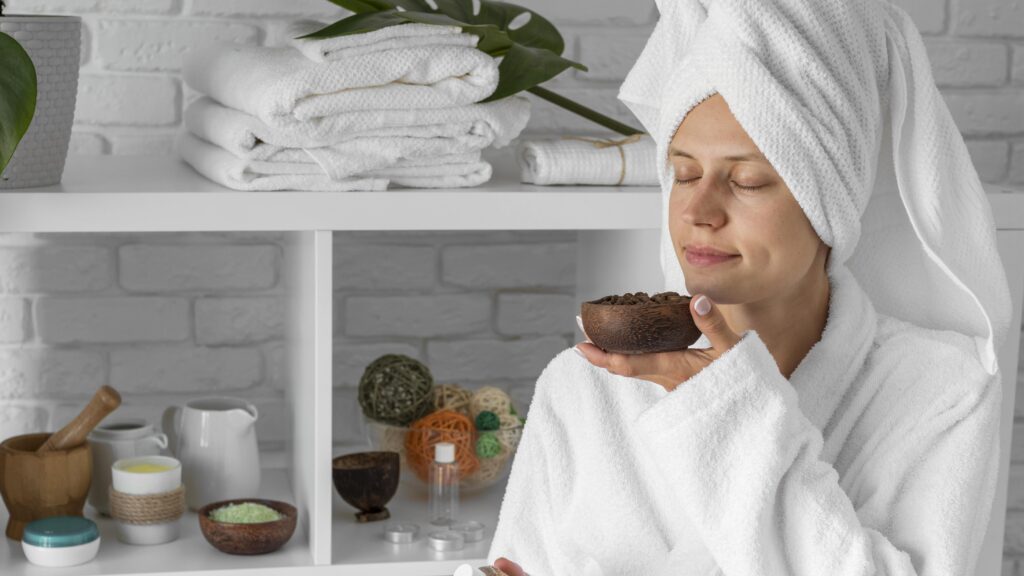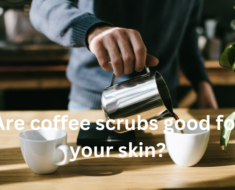Are St. Ives coffee scrubs harmful to your skin? Let’s delve into this popular skincare debate.
In short, while St. Ives coffee scrubs are beloved by many for their exfoliating properties, they can be too harsh for sensitive skin or those with acne-prone conditions.
Curious to learn more about the effects of coffee scrubs on different skin types? Dive into our comprehensive analysis, featuring insights from dermatologists and skincare experts.
St ives coffee scrub bad for skin
St. Ives Coffee Scrub has garnered mixed reviews in the skincare community, with some users praising its exfoliating properties while others caution against its potential drawbacks.
One of the main concerns raised by dermatologists and skincare experts is the abrasive nature of coffee grounds as an exfoliant.
Coffee grounds, when used in a scrub, can have jagged edges that may cause micro-tears in the skin’s surface.
This can lead to irritation, redness, and even breakouts, especially for those with sensitive or acne-prone skin. Additionally, the caffeine content in the scrub may cause further irritation for some individuals.

Furthermore, St. Ives Coffee Scrub contains fragrance and other ingredients that can be harsh on the skin, potentially causing allergic reactions or exacerbating existing skin issues.
While some people may find temporary benefits from using this scrub, it’s essential to proceed with caution and consider alternative exfoliation methods that are gentler and safer for long-term skin health.
Physical vs. Chemical Exfoliation – What’s the Difference?
Physical and chemical exfoliation are two distinct methods of removing dead skin cells and improving skin texture, each with its own benefits and considerations.
- Physical Exfoliation: This method involves using physical abrasives, such as scrubs, brushes, or scrubs with particles like sugar, salt, or crushed nut shells. These abrasives physically slough off dead skin cells, revealing smoother skin underneath. Physical exfoliation can be effective for immediate results and can help unclog pores, but it’s essential to avoid overly harsh scrubs that can cause irritation or micro-tears in the skin.
- Chemical Exfoliation: In contrast, chemical exfoliation utilizes acids like alpha hydroxy acids (AHAs), beta hydroxy acids (BHAs), or enzymes to dissolve dead skin cells and promote cell turnover. This method is often gentler than physical exfoliation and can penetrate deeper into the skin, targeting various skin concerns such as acne, uneven skin tone, and fine lines.
Choosing between physical and chemical exfoliation depends on your skin type, sensitivity, and skincare goals.
Some individuals may benefit from a combination of both methods, while others may find one method more suitable for their needs.
It’s crucial to start slowly with any new exfoliation routine and monitor how your skin responds to determine the most effective approach for you.
Types of Exfoliators – Gentle, Moderate, and Deep
Exfoliators come in various strengths, ranging from gentle to moderate to deep, each catering to different skin types and concerns.
Understanding these types can help you choose the right exfoliator for your skin’s needs.
- Gentle Exfoliators: These are ideal for sensitive skin or individuals new to exfoliation. Gentle exfoliators typically use fine particles or mild acids like lactic acid or fruit enzymes to slough off dead skin cells without causing irritation or redness. They provide a mild exfoliation that helps improve skin texture and brightness without being overly harsh.
- Moderate Exfoliators: These exfoliators are suitable for most skin types, including normal, combination, and mildly oily skin. They often contain slightly larger exfoliating particles or stronger acids like glycolic acid or salicylic acid. Moderate exfoliators offer deeper exfoliation than gentle ones, helping to unclog pores, reduce blackheads, and improve overall skin radiance. It’s important to note that individuals with sensitive skin should patch-test these products first to ensure they don’t cause irritation.
- Deep Exfoliators: These are designed for experienced users or those with resilient skin. Deep exfoliators can include products with coarse particles like sugar or salt scrubs, as well as potent chemical exfoliants such as high-concentration AHAs or BHAs. They provide intensive exfoliation, helping to address stubborn skin concerns like deep-seated blackheads, rough texture, or hyperpigmentation. However, they should be used sparingly and with caution, as they can potentially cause irritation or over-exfoliation if not used correctly.
When choosing an exfoliator, consider your skin type, sensitivity level, and the specific concerns you want to address.
Start with a gentle exfoliator if you’re new to exfoliation or have sensitive skin, and gradually work your way up to moderate or deep exfoliators as needed, always paying attention to how your skin responds.
Here, coffee for skin glow.
Are the physical exfoliators in St. Ives scrubs bad for skin?
The physical exfoliators in St. Ives scrubs, particularly the ground walnut shells and other abrasive particles, can be problematic for some skin types.
The main concern with these physical exfoliators is their potential to cause micro-tears in the skin’s surface.
The jagged edges of these particles can be too harsh, leading to irritation, redness, and even inflammation.
Furthermore, the size and shape of these particles may not be uniform, which increases the risk of uneven exfoliation and further damage to the skin barrier.
For individuals with sensitive skin or conditions like acne, rosacea, or eczema, using such abrasive physical exfoliators can exacerbate these issues.
It’s important to note that not everyone will experience adverse effects from these physical exfoliators, as skin tolerance varies from person to person.
However, it’s generally recommended to opt for gentler exfoliation methods, such as chemical exfoliants or finely milled physical exfoliators, to minimize the risk of irritation and damage to the skin
How to safely exfoliate your face effectively
To safely and effectively exfoliate your face, follow these guidelines:
- Know Your Skin Type: Understand whether you have sensitive, oily, dry, or combination skin, as this will help you choose the right exfoliation method and frequency.
- Choose the Right Exfoliator: Opt for a gentle exfoliator with fine particles or mild acids if you have sensitive skin. For other skin types, consider moderate exfoliators with larger particles or stronger acids.
- Patch Test: Before using a new exfoliator, perform a patch test on a small area of skin to check for any adverse reactions.
- Follow Instructions: Read and follow the manufacturer’s instructions for the exfoliator you’re using. Avoid over-exfoliating, as this can lead to irritation and dryness.
- Be Gentle: Use light pressure and circular motions when exfoliating. Avoid scrubbing too vigorously, especially around delicate areas like the eyes.
- Moisturize: After exfoliating, apply a moisturizer to hydrate and protect your skin.
- Sun Protection: Exfoliation can make your skin more sensitive to sunlight, so always use sunscreen during the day.
By following these steps, you can safely exfoliate your face to achieve smoother, brighter skin without causing irritation or damage.
Here, is black coffee good for skin.
What’s the real problem with the St Ives Face Scrub?
The main concern with the St. Ives Face Scrub, particularly the Apricot Scrub variant, is the use of ground walnut shells as a physical exfoliant.
These shells have jagged edges that can be too abrasive for the skin, leading to micro-tears and irritation. This can compromise the skin’s barrier function and make it more prone to sensitivity, redness, and inflammation.
Additionally, the formulation of some St. Ives scrubs includes ingredients like fragrances and preservatives that can be harsh on the skin, potentially causing allergic reactions or further exacerbating existing skin issues.
The combination of harsh physical exfoliants and potentially irritating ingredients makes the St. Ives Face Scrub a problematic choice for many individuals, especially those with sensitive or acne-prone skin.
It’s often recommended to opt for gentler exfoliation methods that prioritize skin safety and long-term skin health.
Why St ives apricot is bad for your skin?
St. Ives Apricot Scrub has garnered criticism for several reasons that make it potentially harmful to the skin:
- Abrasive Nature: The main issue lies in its use of ground walnut shells as an exfoliant. These particles have sharp edges that can create micro-tears in the skin, leading to irritation, redness, and inflammation.
- Uneven Exfoliation: The size and shape of the walnut shell particles are not uniform, which can result in uneven exfoliation and further damage to the skin’s surface.
- Potential Sensitivity: Individuals with sensitive skin are particularly at risk of adverse reactions due to the harsh nature of the exfoliating particles and other ingredients in the scrub.
- Lack of Skin Benefits: Beyond the exfoliation, the scrub may not offer significant skin benefits compared to gentler exfoliants or chemical exfoliation methods that target specific skin concerns without causing physical abrasion.
These factors contribute to why St. Ives Apricot Scrub is considered bad for the skin, especially when there are safer and more effective exfoliation options available.
Here, is drinking coffee bad for your skin?
Is St. Ives Apricot scrubs really that bad for you? I bought it because other sites recommended it.
The suitability of St. Ives Apricot Scrub depends on individual skin types and sensitivities.

While some people may not experience significant issues using it, many dermatologists and skincare experts caution against its use due to potential drawbacks.
The main concern lies in the abrasive nature of the ground walnut shells used as exfoliants, which can cause micro-tears and irritation, especially for sensitive or acne-prone skin.
Additionally, the formulation may contain fragrances and preservatives that can be harsh on the skin and trigger allergic reactions in some individuals.
It’s important to consider diverse opinions and experiences when choosing skincare products.
While some websites may recommend the St. Ives Apricot Scrub, it’s essential to prioritize your skin’s health and choose exfoliation methods that are gentle, effective, and suitable for your specific skin concerns and sensitivities.
WHY DOES EVERYBODY IN THIS SUB HATE ST. IVES APRICOT SCRUB SO MUCH?
The widespread dislike for St. Ives Apricot Scrub stems from several key factors:
- Abrasive Particles: The use of ground walnut shells as a physical exfoliant in the scrub is a major concern. These particles have rough, uneven edges that can cause micro-tears in the skin, leading to irritation and inflammation.
- Skin Damage: Continuous use of abrasive scrubs like the Apricot Scrub can compromise the skin’s barrier function and make it more susceptible to sensitivity, redness, and breakouts.
- Ineffectiveness: Despite its popularity, many argue that the scrub doesn’t provide significant long-term benefits compared to gentler exfoliation methods or chemical exfoliants that target specific skin concerns without causing physical damage.
- Negative Reviews: Numerous negative reviews and experiences shared by users, coupled with dermatologists’ warnings about its potential harm, have contributed to the overall negative perception of the product within skincare communities.
These factors collectively explain why many individuals and skincare enthusiasts express disdain for St. Ives Apricot Scrub.
Here, is decade coffee bad for your skin?
I know St Ives apricot scrub is bad, is their coffee coconut scrub just as bad or safe to use?
St. Ives Coffee Coconut Scrub is generally considered a better option compared to their Apricot Scrub, but it still has some potential drawbacks to be aware of.
- Exfoliation: The Coffee Coconut Scrub uses coffee grounds as an exfoliant, which can be gentler than the abrasive walnut shells in the Apricot Scrub. However, coffee grounds can still be slightly rough, so it’s important to use gentle pressure when applying the scrub to avoid irritation.
- Fragrance: Like many St. Ives products, the Coffee Coconut Scrub contains fragrance, which can be a concern for those with sensitive skin or fragrance allergies. It’s always advisable to do a patch test before using a new product, especially if you have sensitive skin.
- Overall Safety: While the Coffee Coconut Scrub may be safer than the Apricot Scrub for exfoliation purposes, it’s essential to consider your skin type, sensitivity, and any specific concerns you may have before deciding to use it. If you’re uncertain, consulting with a dermatologist can provide personalized guidance.
How is the St. Ives Apricot scrub bad for your skin?
The St. Ives Apricot Scrub is considered bad for your skin due to its use of ground walnut shells as a physical exfoliant.
These particles have sharp, uneven edges that can create micro-tears in the skin, leading to irritation, redness, and inflammation.
The abrasive nature of the scrub can damage the skin’s protective barrier, making it more vulnerable to sensitivity, breakouts, and long-term skin issues.
Additionally, the formulation may contain fragrances and preservatives that can further irritate the skin, especially for those with sensitive or acne-prone skin.
Here, coffee bad for skin.
The Real Reason You Shouldn’t Buy St. Ives Skin Care Products
The primary reason to avoid buying St. Ives skin care products, especially their scrubs, is their use of harsh physical exfoliants like ground walnut shells.
These exfoliants have jagged edges that can cause micro-tears in the skin, leading to irritation, redness, and potentially long-term damage to the skin barrier.

This abrasive action can worsen skin conditions like acne and rosacea and make the skin more sensitive over time.
Additionally, St. Ives products often contain fragrances and preservatives that can be irritating for many people, particularly those with sensitive or reactive skin.
The lack of consideration for skin sensitivity and the focus on aggressive exfoliation without proper ingredient scrutiny make St. Ives products less desirable compared to gentler and safer alternatives in the skincare market.
Opting for products with proven effectiveness and skin-friendly ingredients can help maintain healthier and happier skin in the long run.
Related faq’s
What are the disadvantages of coffee scrubs?
Coffee scrubs, while popular for their purported benefits, also have several disadvantages to consider:
- Abrasive Nature: Coffee grounds can have rough, uneven particles that may cause micro-tears in the skin, leading to irritation and sensitivity, especially if used with too much pressure.
- Potential Staining: Coffee can stain towels, clothing, and bathroom surfaces, making cleanup more challenging compared to other types of scrubs.
- Allergic Reactions: Some individuals may be allergic to coffee or certain components in the scrub, leading to redness, itching, or hives.
- Over-Exfoliation: Using coffee scrubs too frequently or aggressively can lead to over-exfoliation, disrupting the skin’s natural barrier and causing dryness, redness, and increased sensitivity.
- Environmental Impact: Coffee scrubs may contribute to environmental concerns due to the disposal of coffee grounds into water systems, potentially affecting aquatic life and ecosystems.
Considering these drawbacks, it’s essential to use coffee scrubs with caution, moderation, and awareness of your skin’s sensitivity and tolerance levels.
Is coffee scrub too harsh for face?
Coffee scrubs can be too harsh for the face, primarily due to the abrasive nature of coffee grounds.
The particles in coffee scrubs can have rough edges that may cause micro-tears in the delicate skin of the face, leading to irritation, redness, and sensitivity.
Additionally, the skin on the face is thinner and more sensitive than skin on other parts of the body, making it more prone to damage from harsh exfoliants like coffee grounds.
It’s generally recommended to opt for gentler exfoliation methods specifically formulated for facial skin to avoid potential irritation and damage.
Are coffee scrubs safe for skin?
Coffee scrubs can be safe for the skin when used correctly and with caution. They can provide effective exfoliation, promote circulation, and temporarily improve skin texture.
However, there are considerations to keep in mind. The coarse texture of coffee grounds can be too abrasive for sensitive skin or when used with excessive pressure, leading to irritation or micro-tears.
Additionally, individuals with certain skin conditions like eczema or rosacea may find coffee scrubs too harsh.
It’s important to patch-test first, use gentle motions, and not over-exfoliate to ensure safety and minimize the risk of skin damage.
Is St Ives walnut scrub bad for your skin?
Yes, the St. Ives Walnut Scrub is generally considered bad for your skin due to its abrasive nature.
The ground walnut shells used as exfoliants have sharp, uneven edges that can cause micro-tears in the skin, leading to irritation, redness, and inflammation.
Continuous use of such harsh physical exfoliants can compromise the skin’s natural barrier, making it more susceptible to sensitivity, breakouts, and long-term damage.
It’s advisable to opt for gentler exfoliation methods that prioritize skin safety and avoid products with overly abrasive ingredients like the walnut scrub from St. Ives.
Does St Ives Apricot Scrub damage skin?
Yes, the St. Ives Apricot Scrub can potentially damage the skin due to its use of ground walnut shells as an exfoliant.
These particles have sharp edges that can cause micro-tears in the skin, leading to irritation, redness, and inflammation.
Continuous use of such abrasive physical exfoliants can compromise the skin’s natural barrier and make it more susceptible to sensitivity, breakouts, and long-term damage.
It’s advisable to opt for gentler exfoliation methods that prioritize skin safety and avoid products with harsh or uneven exfoliating particles like those found in the St. Ives Apricot Scrub.
Is St. Ives apricot scrub fresh skin bad for my face?
The St. Ives Apricot Scrub, specifically the “Fresh Skin” variant, can be bad for your face due to its use of ground walnut shells as an exfoliant.
These shells have sharp, uneven edges that can cause micro-tears in the delicate skin of the face, leading to irritation, redness, and inflammation.
Continuous use of such harsh physical exfoliants can compromise the skin’s natural barrier and may result in increased sensitivity and long-term damage.
It’s advisable to choose gentler exfoliation methods specifically formulated for facial skin to avoid potential irritation and protect your skin’s health
Why is St. Ives Apricot Scrub bad for a skin with acne?
St. Ives Apricot Scrub is considered bad for skin with acne due to its abrasive nature.
The ground walnut shells in the scrub have sharp edges that can cause micro-tears in the skin, leading to irritation and inflammation, which can exacerbate acne.
Harsh physical exfoliation can also spread bacteria, further aggravating breakouts. Additionally, the formulation of the scrub may contain ingredients that can clog pores or irritate acne-prone skin.
It’s advisable for individuals with acne to opt for gentler exfoliation methods and skincare products specifically designed to address acne without causing additional irritation or damage.
Can we use an apricot scrub every day?
Using an apricot scrub, such as the St. Ives Apricot Scrub, every day is generally not recommended.
The abrasive nature of the scrub’s ground walnut shells can be too harsh for daily use, especially on delicate facial skin.
Daily exfoliation with such a scrub can lead to over-exfoliation, causing irritation, redness, and potentially micro-tears in the skin.
It’s advisable to use exfoliating scrubs like apricot scrubs 2-3 times per week at most, allowing the skin time to regenerate between exfoliation sessions and avoiding excessive damage or sensitivity.
Conclusion:
In conclusion, St. Ives coffee scrub can be harmful to the skin due to its abrasive nature and potential to cause microtears.
It’s essential to opt for gentler exfoliants that don’t risk damaging the skin’s barrier and causing irritation or inflammation.






